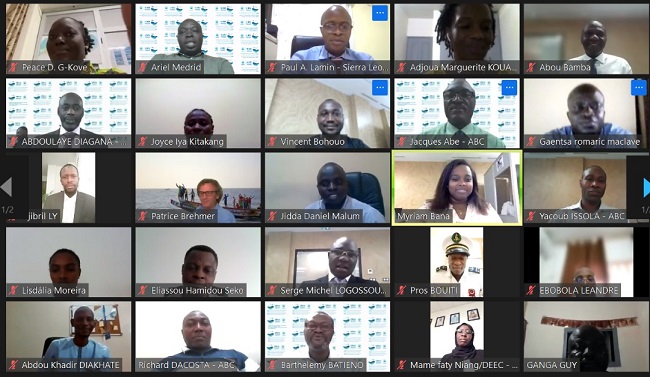At the opening of the 13th Conference of the Parties (COP13) to the Abidjan Convention on Monday, December 13, 2021, which coincides with the celebration of the 40th anniversary of the Convention, the organisation used the occasion to look back and take stock of activities carried out over the last four decades in favour of the marine and coastal resources of the Atlantic façade of the African continent.

“It’s true that a lot has been done,” said Abou Bamba, Executive Secretary of the Convention, even as he listed key achievements to include the establishment of a fully fledge secretariat, four additional protocols, amended texts of the Convention, creation of a regional centre of emergencies, a strong network of partners, implementation of several field projects, and emergence of new Parties.
The COP, which will end on Wednesday, December 15, is holding virtually.
He noted that the Convention for Cooperation in the Protection, Management and Development of the Marine and Coastal Environment of the Atlantic Coast of the West and Central Africa Region, otherwise known as the Abidjan Convention, had become the main actor in the oceans’ debate in West, Central and Southern African.
The Executive Director added: “It’s a unique organisation with the convening power and the institutional, legal, scientific, technical mandate from Contracting Parties to sustainably manage the ocean and coastal resources in the region.”
He lamented, however, that the legacy is being jeopardised by the non-payment of dues and arrears by several Contracting Parties, adding that some of them have about 10 years of arrears but are still benefitting from the Secretariat services and projects.
“Today we have reached the amount of more than $3.4 million in terms of unpaid contributions. This is not acceptable if we want to have a solid and viable convention which will last for another 40 years.
“We therefore hope that when you discuss the financial matters during the experts’ segment, you’ll come up with strong and genuine recommendations to the ministers so that sound decisions are made to reduce the surge on the Abidjan Convention Trust Fund,” added Bamba.
Ms Susan Gardner, Director, Ecosystems Division, United Nations Environment Programme (UNEP), in her statement, also expressed concern over the unpaid contributions by Parties, saying that the Convention’s Trust Fund is in an “extremely grave financial situation”.
She stated: “Despite the urgent appeals launched over the last 24 months as well as the various follow up reminders sent to your governments regarding the payment of the annual contributions and notifying you of the arrears owed to the Trust Fund, the financial situation of the Trust Fund of the Convention is still of great concern.
“To date, the effort that the Chair of the Bureau and the Secretariat have made to rectify the situation have had very little effect.
“The unpaid contributions to the Trust Fund of the Abidjan Convention have now reached the critical threshold of over $3.4 million. I do not need to impress upon you the gravity of the situation.
“I reiterate this urgent call to the Contracting parties to pay their statutory contributions to the Abidjan Convention Trust Fund which is a legally binding instrument.
“I count on you, the Contracting Parties, owners of the Convention, to undertake active engagement with your governments so that this situation can be resolved.
“The existence of the Abidjan Convention is at stake, and with it the extremely important and valuable work that we have, all together, set out over the last 40 years to protect, manage and develop the Marine and Coastal Environment of the Atlantic Coast of the West, Central and Southern Africa Region.”
Gardner also rolled back the years, recalling that, 40 years ago, “countries of the Atlantic façade of the African continent met in Abidjan, Cote d’Ivoire, to lay down the foundations for a vivid debate and actions towards the sustainable management of marine and coastal resources in this region of the continent”.
She added: “After four years of preparatory activities, UNEP convened the Conference of Plenipotentiaries on Co-operation in the Protection and Development of the Marine and Coastal Environment of the West and Central African Region in Abidjan from March 16 to 26, 1981. The Conference adopted an action plan for the West and Central African Region also known as WACAF and two legal instruments: the Abidjan Convention, and its Protocol concerning Co-operation in Combating Pollution in Cases of Emergency.
“As of October 1981, the legal agreements have been signed by twelve coastal States of the region. The Government of Cote d’Ivoire has been designated as the Depository for the Convention and Protocol. UNEP has been designated as the secretariat of the Convention and Protocol.
“Since this date, a lot has happened, and the Convention has evolved from being a conservation focused Convention to an instrument that also addresses the development aspects related to the sustainable management of marine and coastal resources.
“While improving the governance of the marine and coastal resources in the region, the Convention has become the main actor in the ocean debate in West, Central and Southern African.
“This achievement will not have been possible without the involvement of the Contracting Parties but also the partners such as FAO, GEF, SIDA, UNESCO, UNIDO, UNDOALOS, USAID, the Government of the United States and Norway, to name a few.”
